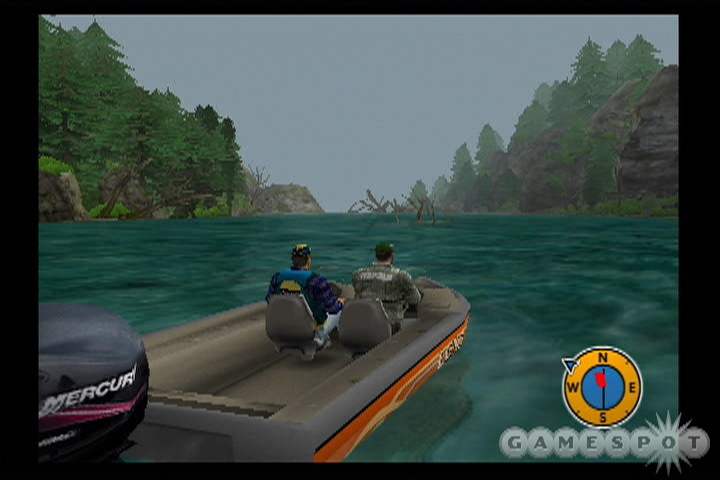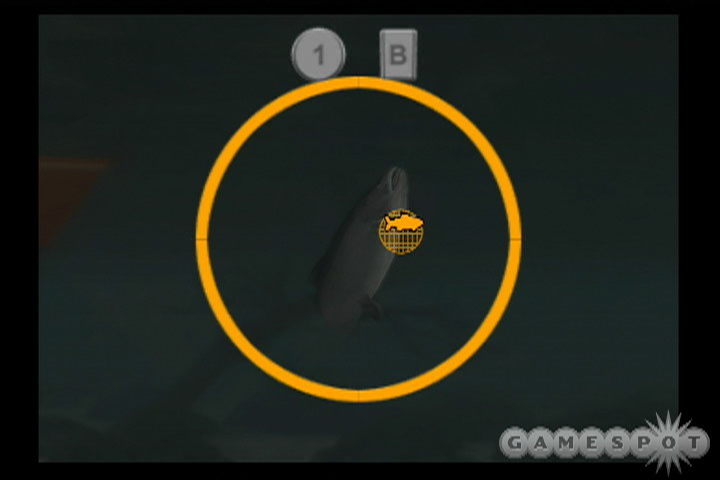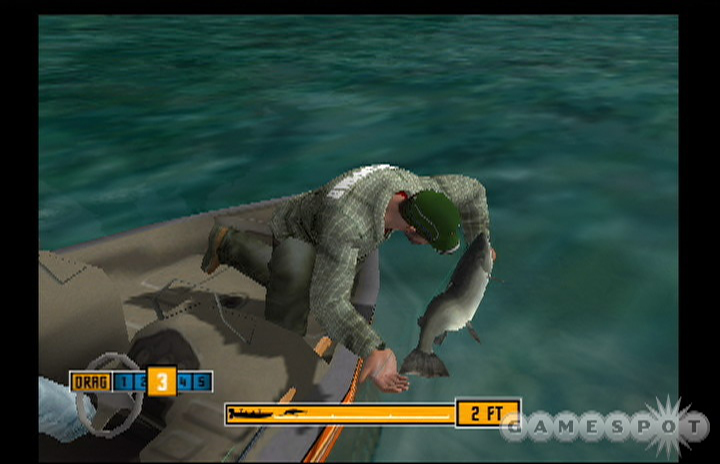One of the big complaints with fishing games of the past was the need to purchase a separate controller to accurately simulate the mechanics that are such a big part of the sport. The Nintendo Wii's unique control doesn't have that problem because the Wii Remote is a natural substitute for the traditional rod-and-reel controller. Unfortunately, the unresponsive controls and monotonous gameplay in Rapala Tournament Fishing, the first full-fledged fishing game to take advantage of the Wii Remote, don't make it worth a cast.

Rapala has a number of gameplay modes to play through, including free fishing, arcade mode, and time trials, all of which are as straightforward as their names imply. The most compelling mode in the game is tournament mode. Here, you start out by creating a profile, picking an avatar from a handful of rugged-looking types, and entering in various tournament events. The tournaments are all grouped by type, such as weight challenges, length challenges, and so on. To move onto the next tournament in the line, you'll need to finish in the top 10 of all the events in the current tournament. The events are typically organized by fish species--such as a largemouth bass or crappie challenge--and, for the most part, the lakes and rivers you compete in will serve up the exact type of fish you want. In fact, only rarely will you haul up anything other than the exact species of fish you're looking for, though the size or weight of the fish don't always fit to the event requirements.
The controls in Rapala might seem overwhelming at first, but even nonfisherman will figure out the mechanics pretty quickly. To cast the line, you hold down the A button, make a casting motion with your arm, and let go of the A button near the top of your casting arc. Reeling in the line is as simple as moving the Nunchuk in a circular motion or pressing the A button. You can move the line either left, right, or back by moving the Wii Remote in the same direction and increase or decrease the drag on the line by pressing up or down on the D pad on the remote. There are also controls for driving your boat to various locations on the river or lake you are fishing. Both the fishing and boat controls have an alternate scheme if you are unhappy with the default. For the most part, the Wii's sensor picks up the more subtle motions of your hand; unfortunately, the on-screen motions you make are quite noticeably delayed, presenting a strange disconnect between your movement with the remote and what your angler is doing onscreen.
Once you've got a strike, it's a matter of reeling the fish into the boat, and while the controls make sense mechanically their unresponsive nature makes for a pretty unsatisfactory experience. While reeling with the A button or Nunchuck, you yank back the Wii Remote to pull the fish in quickly. You'll want to keep an eye on the tension indicator at the top of the screen; it indicates how much tension is on the line at any given moment. With bigger fish, you'll want to adjust your drag in order to prevent the fish from snapping the line. There are other things to consider, such as the action of your fishing pole (which determines just how much it will bend when the fish is close to the boat), which is only a big deal for the bigger fish found in the game. To bring larger fish into the boat, you'll need to complete a small netting minigame that has you first move a net over an onscreen fish icon then quickly enter in a button combination (such as 1, 2, B, A) to finally haul the fish into the boat.
Beyond the quirky controls, the biggest problem with Rapala Tournament Fishing is that it's at once too easy and too esoteric for either experienced fishing fans or newcomers to the genre. If you've never played a fishing game before, you will likely be a bit overwhelmed by the sheer amount of gear available to you from the start. There are different rods with varying action levels, different lines with their own characteristics, and the lures...well, the lures are an entirely different matter. Because this is a Rapala-sponsored fishing game, all of the lures in the game are Rapala-branded, which is probably a good thing for outdoor sporting fans who are familiar with the brand. However, for the newbie, this glut of lure models is incomprehensible at first, and the game doesn't do nearly a good enough job of explaining (or even hinting at) when and why you would want to use one lure over another. Granted, some of this can be figured out by trial and error, but a primer on lure tactics would be a welcome addition to this kind of game.

While experienced outdoorsmen will likely appreciate the true-to-life performance of the different lures in the water and the sheer number of lures available, the game is far from the perfect indoor counterpart for veteran anglers. All of the esoteric complexity in Rapala's tackle box is counteracted by the ease of the game. Regardless of which of the three available difficulty levels you play, the fish are biting in Rapala. The only difference is how long you wait for a bite and the specificity of the fish/lure combination. Provided you follow your in-boat buddy's advice on where in the incredibly small environments you should cast your line, you'll usually come up with plenty of fish. Furthermore, the fish don't really put up that much of a fight. Sure, you'll snap a line every once in a while, and a fish will occasionally slip loose of its hook; but, for the most part, if you pay attention to your tension meter and the onscreen advice (such as when to move left or right to coincide with the struggles of the fish), you'll be just fine.
Because there's so little fight in the fish, and they're relatively easy to come by (provided you happen on the right lure), you'll likely be bored pretty quickly with the tournament events in Rapala. While all of the events are timed, you can quit out to the results of the tournament in many of the events after you've caught the allotted number of fish. A notable exception is the "total" events, where victory is usually determined by the total number of fish caught or the total weight. Here, you'll need to spend the maximum amount of time on the water to make sure your haul is as large as possible. This means you'll also spend the maximum amount of time feeling bored.
The most notable aspect of Rapala's graphics is the tiny environments in which to fish. While there is some decent visual variety to the lakes and rivers you compete in, they all share one thing in common: You can usually get from one side to the other in less than a minute. To make matters worse, once you've found a hot spot in the water, it usually doesn't run dry, so there's no need to explore anywhere else. The game provides two views to choose from when fishing: a third-person point of view from the boat and a more useful composite view of the lure and fish underwater, as well as a side view of your fisherman. Using this view, you can watch out for on any interested fish near your lure and, once the bite is made, keep an eye on the action of your rod. There are also a good number of visual quirks under water. While the fish models themselves look fine, they'll often pass right through the hook before taking a bite. Also, when reeling in a fish close to the boat, the animation of the fish's struggle will noticeably skip, and the fish will often pass clip through the boat's hull before you haul it in.

While on the water, you're accompanied by a guide who provides feedback on your various fishing activities, such as where to stop, the quality of your cast, and advice on how to reel a fish. The actor who provides the voice work does so in a nice conversational tone, but it isn't long before his feedback becomes repetitive. It's also mostly inaccurate, especially his critiques of your casts; you can easily ignore his advice most of the time. The other sound effects in Rapala, such as the splashes of fish leaping out of the water during struggles or the occasional sound of wildlife in the background, are decent enough. The music in the game is also pretty catchy but, like the commentary from the guide, it isn't long before you've heard it all before.
In all, it's hard to see how Rapala Tournament Fishing will appeal to anyone. Its cryptic lure lore will frustrate fishing novices; its diminutive environments and brain-dead fish will do the same for experienced fishermen looking for a game that tests their skills. Game fans looking for a different use of the Wii's control scheme will also likely be frustrated by its unresponsive mechanics and tedious repetition. While fans of the nuts and bolts of fishing might enjoy the depth and breadth of gear found in the game, putting it all to use in the water turns out to be more frustrating than it is fun.



